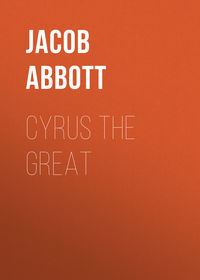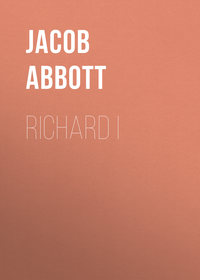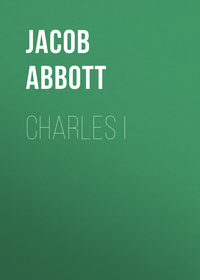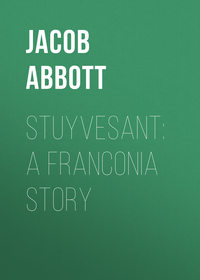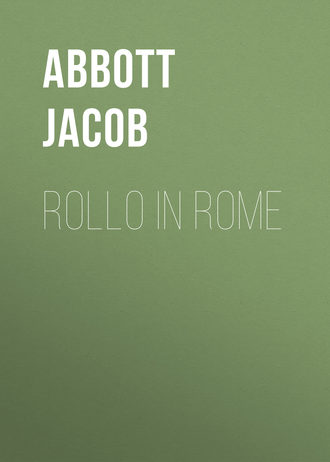
Rollo in Rome
Mr. George was at this time just writing the address on the back of his letter. He did not say any thing, but Rollo observed a very slight and almost imperceptible shaking of his head.
"You don't like the plan very well, uncle George," said Rollo.
"Not very well," said Mr. George. "I feel a little afraid of it."
"Then it is of no consequence," said Rollo. "I don't care a great deal about going."
Most boys, perhaps, under these circumstances, would have asked why, in order that, after hearing their uncle's objections to their plans, they might argue against them. But Rollo knew very well that this would be very bad policy for him.
"If uncle George finds that he has a long argument to maintain against me, every time that he refuses me any thing," said he to himself, "he will soon get tired of having me under his care."
So he acquiesced at once in what he perceived was his uncle's opinion, and resolved to tell Copley, when he saw him, that he could not go to Ostia.
Copley was to have called that evening at Rollo's room, to obtain his answer; but on further reflection, he concluded not to do so.
Indeed, he had a secret feeling that neither Rollo's uncle nor his own brother would approve of the plan of two such boys going alone, in such a country, on an expedition which was entirely outside of the usual range of tourists and travellers. That this expedition was outside the range was evident from the character of the steamboat that the boys had seen, which was evidently not intended for the conveyance of ladies and gentlemen, but of people of the country—and those, moreover, of the lowest class.
So Copley concluded that if he were to go at all to Ostia, it would be necessary for him to go by stealth, and he resolved not to say any thing about his plan to his brother or sister. He was very sure, too, that Rollo would fail of obtaining his uncle's consent. So he concluded to say no more to Rollo on the subject, but instead of that, he proposed the plan to another boy of his acquaintance, who lodged with his friends at another hotel.
"The best way will be," said he, when he made the proposal, "for us not to tell any body where we are going."
"Then they'll wonder where we are," said the boy, "and be frightened half to death about us."
"But we can leave word when we go, with the porter of the hotel, or the concierge," said Copley, "that we have gone down the river in the steamboat, and shall not be back till night."
"Good," said the other boy; "that's what we'll do."
Accordingly, the next morning, the two boys left word at their respective hotels where they were going, and set forth. They stole away very secretly, and after running round the corner, they crept along close to the wall of the hotel, until they thought they were at a safe distance. They reached the boat in good season, went on board, and in due time set sail.
About ten o'clock, when the two boys had been gone about an hour, Mr. William began to miss his brother, and to wonder where he had gone. So he rang the bell, and his courier came into the room.
"Pacifico," said Mr. William, "do you know where Copley is?"
"No, sir," said Pacifico; "I did not see him from since it was nine o'clock."
"Go down below," said Mr. William, "and inquire of the concierge and the porters if they have seen him, or know where he is."
Mr. William followed Pacifico as he went out, in order to speak a moment to a friend of his who occupied the next apartment. As he came back he met Pacifico at the head of the stairs, and received his answer there. The answer was, that Copley had gone down the river to Ostia with another boy.
Mr. William was greatly astonished to hear this. He, however, said nothing to Pacifico, but after pausing a moment, as if reflecting upon what he had heard, he went back into his own apartment.
"Maria," said he, addressing his young wife, "where do you think Copley has gone?"
"I cannot imagine," said Maria.
"He has gone down the Tiber in the steamer to Ostia," replied Mr. William.
"Is it possible?" exclaimed Maria, in astonishment.
"Yes," said William; "and I am very glad of it."
"Glad of it?" repeated Maria, surprised more and more.
"Yes," said Mr. William; "for it decides me what to do. I shall send him home with his uncle. I have been half inclined to do this for some time, and this settles the question. It destroys all the peace and comfort of our journey to have a boy with us that is determined to have his own way, without regard to the inconvenience or anxiety that he occasions me."
"But how will you manage to get him to go with his uncle?" said Maria. "He will refuse to go, and insist on accompanying us, for his uncle is going directly home, which is what he does not wish to do."
"I'll manage that," said Mr. William. "I'll take a hint from his own way of proceeding. I will go off and leave him."
"O husband," said Maria, "that will never do."
"You'll see how I will manage it," said Mr. William.
So saying, Mr. William rang the bell. Pacifico immediately appeared.
"I wish to write a letter," said Mr. William. "Bring me some paper, and pen and ink."
Pacifico brought the writing materials, and laid them on the table.
"I have concluded to leave town this afternoon," said Mr. William, as he took up the pen and began to make preparations to write. "I intend to go as far as Civita Castellana to-night. We will set out at two o'clock. I wish you to go and find our vetturino, and direct him to be here half an hour before that time with the carriage, to load the baggage. He knows that we were going soon, and he will be prepared. In the mean time you may get our baggage ready. Copley's trunk, however, is not to go. Pack that, and send it by a porter over to the Hotel d'Amerique. I am going to leave him there under the care of his uncle."
"Very well, sir," said Pacifico; "I shall do it."
Pacifico retired, and Mr. William proceeded to write his letter. When it was finished, he read it to his wife, as follows. It was addressed to his father in England.
"Rome, June 20, 1858."Dear Father: We are all well, and, on the whole, have enjoyed our residence in Rome very much. We are now, however, about ready to leave. We set off this afternoon for Florence and the north of Italy.
"I have concluded, all things considered, to let Copley return to you with his uncle. Though a pretty good boy in other respects, he does not seem to be quite willing enough to submit to my direction, to make it pleasant for me, or safe for him, that we should travel together. I will not say that it is his fault altogether. It is perhaps because there is not difference enough in our ages for him to feel that I ought to have any authority over him. At any rate, he is unwilling to acknowledge my authority, and he takes so many liberties that I am kept in a constant state of anxiety on his account. Besides, I do not think that it is safe for him to be so much at his own disposal. This country is full of thieves, brigands, and rogues, of the most desperate and reckless character; and young men sometimes suffer extremely in falling into their hands. Copley is not aware of the danger, and he thinks that the restraints which I feel compelled to impose upon him are unnecessary and vexatious. Often he will not submit to them. To-day, he has gone down the river on board one of the country steamers, without saying any thing to me about it; and, though I do not suppose he will get into any difficulty, in making such an excursion, still the fact that he takes the liberty of doing such things keeps me continually uneasy about him, and there is danger that, sooner or later, he will get into some serious trouble.
"I have, accordingly, concluded to leave him under uncle's charge, with a view of having him return with uncle to England, by way of the Mediterranean. Uncle will leave here in a few days, and you may accordingly expect to see Copley at home again in the course of a week after receiving this.
"With love from Maria and myself for all at home, I am your dutiful son,
"William Grant."Mr. William sealed his letter, and then took it down to the "bureau," as the hotel office is called, where he left it with the secretary of the hotel, to be sent to the post office.
He then went out at the front door of the hotel to the public square before it, and there taking a carriage, he ordered the coachman to drive to the Hotel d'Amerique. When arrived there, he went to his uncle's apartment, and explained the plan which he had formed, and the reason for it. His uncle said that he would very readily take Copley under his charge. Mr. William then said that he was intending to leave town that day, but he should leave Thomas at his hotel to wait for Copley, and bring him over to the Hotel d'Amerique as soon as he returned.
This arrangement was carried into effect. Mr. William directed Thomas to remain in town, to take care of Copley on his return from Ostia, and deliver him safely into his uncle's hands. It occasioned Mr. William no inconvenience to leave Thomas behind for a day, since, though Thomas usually travelled in the same carriage with the family, the vetturino himself always drove. Thomas, together with Pacifico, the courier, rode on an outside seat in front, while Copley sometimes rode inside, though more frequently on the driver's seat, by the side of the vetturino.
"Thomas," said Mr. Grant, in giving Thomas his instructions, "I am going to set out on my journey this afternoon, but I shall leave you behind, to come on to-night by the diligence. You will find me at the Hotel of the Post, at Civita Castellana. I wish you to wait here until Copley comes home, and then tell him that I have gone out of town, and shall not be back to-night, and that he is going to spend the night at the Hotel d'Amerique with his uncle. Do not tell him where I have gone, nor that you are coming after me. His uncle will tell him all to-morrow morning."
In the mean time, while these occurrences had been taking place at the hotel, Copley and his companion had been sailing down the river on board the little steamboat. They had, on the whole, a pretty pleasant time, though they were somewhat disappointed in the scenery on the banks of the river. The country was perfectly bare of trees, and destitute of all cultivation. There were no villages, and scarcely a human habitation to be seen. The boys, however, met with no trouble, and returned safely home about four o'clock.
Copley found Thomas waiting for him at the hotel door.
"Mr. Copley," said Thomas, as Copley advanced towards the door, "your brother has gone out of town, and will not be back to-night, and I was to wait here for you, and tell you that you were to go and spend the night at your uncle's apartment at the Hotel d'Amerique."
"Good!" said Copley. He felt quite relieved to find that his brother had gone away, as he thus escaped the danger of being called to account for his misdemeanor.
"Where has he gone?" asked Copley.
"I can't say," said Thomas; "but perhaps your uncle can tell you."
By the phrase "I can't say," Thomas secretly meant that he was not at liberty to say, though Copley understood him to mean that he did not know.
"Very well," said Copley; "I don't care where he has gone. It makes no difference to me."
Copley found that it did make some difference to him, when he learned, the next morning, that his brother had set out on his journey to the north of Italy, and to Switzerland, and had left him behind to return home at once with his uncle by sea. His uncle did not tell him that night where his brother had gone, for fear that Copley might make some difficulty, by insisting on going on after him in the diligence with Thomas. Accordingly, when Copley asked the question, his uncle only answered vaguely, that his brother had gone out somewhere into the environs of Rome. The next morning, however, he handed Copley a note which his brother had left for him, which note Copley, on opening it, found to be as follows:—
"Wednesday Morning."Dear Copley: I have concluded to set out this afternoon on my journey north. I am sorry that you are not here to bid me good by. I did not know that you were going down the river.
"It must be hard for a boy as old as you to be under the command of one who is, after all, only his brother,—and not a great many years older than he is himself,—for I am not quite ten years older than you. I know you have found this hard, and so I have concluded that you had better return home with uncle. One of these days, when you grow up to manhood, you can make a journey into Italy again, and then you will be your own master, and can do as you please, without any danger. Wishing you a very pleasant voyage,
"I am your affectionate brother,"William Grant."Copley's indignation and rage at reading this letter seemed at first to know no bounds. He was, however, entirely helpless. His brother had gone, and he did not even know what road he had taken. Thomas had gone, too, so that there was no help for him whatever.
In two days after that, he went with his uncle to Civita Vecchia, the port of Rome, on the Mediterranean, and there embarked on board the steamer "for Marseilles direct," and so returned to England.
Chapter X.
The Vatican
On the day when Rollo went with Charles and Allie to see the Tarpeian Rock, the reader will perhaps recollect that Mr. George was engaged at the reading room in reading the American papers which had that morning arrived. When Rollo returned from his excursion, he found that Mr. George had not got home, and he accordingly concluded to go to the reading room and see if he could find him.
This reading room is attached to an English bookstore and library, and is a great place of resort for visitors at Rome. It is situated at the end of the Piazza di Spagna, which is one of the principal and most frequented public squares in Rome. This square contains several of the chief hotels, and a great many shops. The bookstore of Piale is the general centre of news and intelligence for all English and American visitors. Here people come to make inquiries for their friends, for there is a register kept at the library with the names of all the English and American visitors in Rome recorded in it, and the addresses of the hotels or private houses where they are lodging. Here all sorts of notices are posted up, such as advertisements of things lost or found, of parties forming for excursions, of couriers wanting places or families wanting couriers, of paintings for sale, carriages for sale or for hire,—and all such things.
Piale's establishment contains a number of different rooms. The first that Rollo entered on arriving at the place was the bookstore. This was a small room. There was a desk at one end, where a clerk was sitting. There were shelves filled with books all around the room, and a large table in the centre, which was also covered with books arranged in tiers one above the other in a sloping direction. There were several doors leading off from this apartment, one of which led to a room where a circulating library was kept, and another to the reading room.
When Rollo entered the bookstore, he saw several groups of visitors there. There were two or three ladies looking over the books on the shelves. There was a group of gentlemen standing near the desk, talking together, with a paper in their hands which seemed to contain a list of names. Just as Rollo entered, a carriage drove up to the door, and two ladies dismounted from it and came in. Rollo's attention was first attracted to these two ladies. One of them, on entering, accosted the clerk, and asked to look at the register. The clerk immediately gave the two ladies seats at a side table, where there was a large book full of names and addresses. The ladies sat down, and began to look over the book. They had just arrived from Naples, and they wished to know what friends and acquaintances of theirs there were in town.
Rollo began to examine the books on the table, or counter, in the middle of the room, and while doing so he happened to pass near the gentlemen that were looking at the paper.
"We want twelve," said one of the gentlemen, "and we have got only nine."
"Yes," said the other, "we want three more. It must be that there are a great many in town who would like to go, if we could only find them out."
Rollo's attention was immediately arrested by these words. It was obvious that the gentlemen were forming a party to go somewhere, or to see something, and he felt quite confident that his uncle George would like to join them.
"At any rate," said he to himself, "I should like to go, wherever it is."
So Rollo summoned courage to accost the persons who were consulting together, and to ask them if they wished to find some gentlemen to make up a party.
"Gentlemen or ladies either," said one of them, "no matter which. We are making up a party to go and see the statues in the Vatican by torch light."
When Rollo heard the words "torch light," his interest in the proposed party was greatly increased, and he said he had no doubt that his uncle would like to go.
"I am very sure he would like to go," said Rollo, "and to take me."
"Very well," said one of the gentlemen, "that will make two. And we only want three. Where is your uncle?"
"He is in the reading room," said Rollo. "Wait a moment, and I'll call him."
"That's right," said the gentleman. "Tell him it will cost us a scudo and a half apiece."
So Rollo, taking out half a paul from his pocket,—that being the price of admission to the reading room for a single day,—and giving it to the clerk at the desk, opened a door by the side of the desk, and passed into the reading room. Instead of being only one reading room, however, he found that there were two, with an open door leading from one to the other. There were a great number of very comfortable sofas and arm chairs all about these rooms, and great tables in the middle of them covered with newspapers and magazines. The walls of both rooms were completely covered with paintings of all sizes, most of which had been left there for sale. There were a great many gentlemen sitting around the tables and upon the sofas, reading. Among them Rollo soon found Mr. George. He had established himself in a comfortable arm chair, near a great window that looked out upon the square. But he was obliged to keep the curtain down, on account of the beggars outside, that gave him no peace as long as they could see him.
"Uncle George," said Rollo, "here are some gentlemen who want to make up a party to go and see something by torch light, and I thought that perhaps you and I would like to join it."
"Where is it that they are going?" asked Mr. George—"to the Vatican?"
"Yes," said Rollo, "it is the Vatican. A scudo and a half apiece."
"Very well," said Mr. George. "I should like to go. Where are the gentlemen?"
"They are out here in the bookstore. Come out and I will show them to you."
So Mr. George laid down his paper, and followed Rollo out into the bookstore. Rollo led the way to the place where the gentlemen were standing, and then introduced his uncle, in a distinct and audible voice, thus,—
"This is my uncle, gentlemen, Mr. George Holiday."
The gentlemen greeted Mr. Holiday in a very polite manner, and informed him of their plan, and that they wanted three more names to make up the necessary number for a party.
And here I ought to say in explanation, that what is called the "Vatican" is a vast collection of very magnificent and imposing buildings,—consisting of palaces, chapels, halls, galleries, and the like, almost without number,—and it is filled with paintings, sculptures, manuscripts, books, jewels, gems, and other curiosities and treasures of incalculable value. It is situated in close proximity to the great Church of St. Peter's—the largest and most gorgeous church in the world. Indeed, the church and the palaces form, as it were, one vast architectural pile, which is of almost inconceivable magnificence and grandeur.
The various edifices which compose the Vatican were several centuries in building, and the immense magnitude and extent of the edifice, and the exhaustless wealth of the treasures of art deposited there, astonish every beholder. The buildings are so extensive that they require eight grand staircases and two hundred smaller ones to gain access to the different stories. There are twenty open courts and over four thousand different rooms. Some of these rooms are galleries nearly a quarter of a mile long, and are filled on each side with sculptures and statuary, or other works of art, from end to end. The length of these galleries is not, however, out of proportion to other parts of the structure. The church of St. Peter's, including the portico, is considerably more than a quarter of a mile long.
Now, among the treasures of the Vatican are an immense number of ancient statues which were dug up, in the middle ages, in and around Rome; and some of these sculptures are the most celebrated works of art in the world. They are arranged with great care in a great number of beautiful chambers and halls, and are visited during the daytime by thousands of people that have come to Rome from every part of the world. The picture galleries, the collection of ancient curiosities, and the library rooms containing the books and manuscripts, are also in the same manner thrown open, and they are thronged with visitors almost all the time. These apartments are so numerous and so extensive that in one day a person can do little else than to walk through them, and give one general gaze of bewildering wonder at the whole scene. And a very long walk it is, I can assure you. At one time, when I set out from the painting rooms, (which are far in the interior of the buildings,) with a party of friends, intending to go out, in order to go home, we walked steadily on at our ordinary pace, without stopping, or deviating from our way, and we found that it took us twenty minutes to get out to our carriage!
In addition to these visits made during the day, small parties are sometimes formed to visit the galleries of statuary by night. It is found that the illumination of a torch, by the strong contrasts of light and shade which it produces, brings out the expression of the statues in a very striking manner, so as to produce sometimes a most wonderful effect.
It is, however, somewhat expensive to exhibit these statues by torch light, partly on account of the cost of the torches, and partly on account of the attendants that are required. The cost is nearly twenty dollars. It is accordingly customary to make up a party, whenever an evening visit to the Vatican is proposed, in order to divide the expense. The number that can see the statues to advantage in these evening visits is from twelve to fifteen. A party of twelve is sufficient to pay the expense at the rate of a scudo and a half for each person.6
It was such a plan as this that the gentlemen were forming, whose party Mr. George and Rollo were now proposing to join.
The gentlemen had been much pleased with Rollo's appearance and demeanor when he accosted them, and they were now still more pleased, when they saw Mr. George, to find that he was a young gentleman, of about their own age, and that he was so prepossessing in his countenance and in his air and manner. Mr. George readily agreed to join the party. They asked him if he knew of any body else that he thought would like to go. He inquired whether there were to be any ladies in the party. They said that there were to be several. "Then," said Mr. George, "I will be responsible for the twelfth place. I am quite sure that I can find some person that would like to go.
"And suppose I find more than one?" said Mr. George.
"That will do no harm," replied the gentlemen. "We can have from twelve to fifteen in the party."
"Then I will take the three places," said Mr. George, "and I will pay my proportion now. Which of you gentlemen acts as treasurer?"
One of the three gentlemen said that he had undertaken to collect and pay over the money, but he added that it was not necessary for Mr. George to pay at that time. Mr. George, however, preferred to do so, and he accordingly took out his purse and paid his four scudi and a half, which was the amount due for three persons. The gentlemen seemed to be quite pleased to find that their party was thus made up, and they told Mr. George that since he had taken and paid for the three remaining places, he might bring with him any number of persons that he pleased, so long as he did not make the party more than fifteen in all. It was agreed, too, that the party was to rendezvous that evening, at eight o'clock, at the foot of the grand staircase, leading from the portico of St. Peter's up to the principal court of the Vatican.



